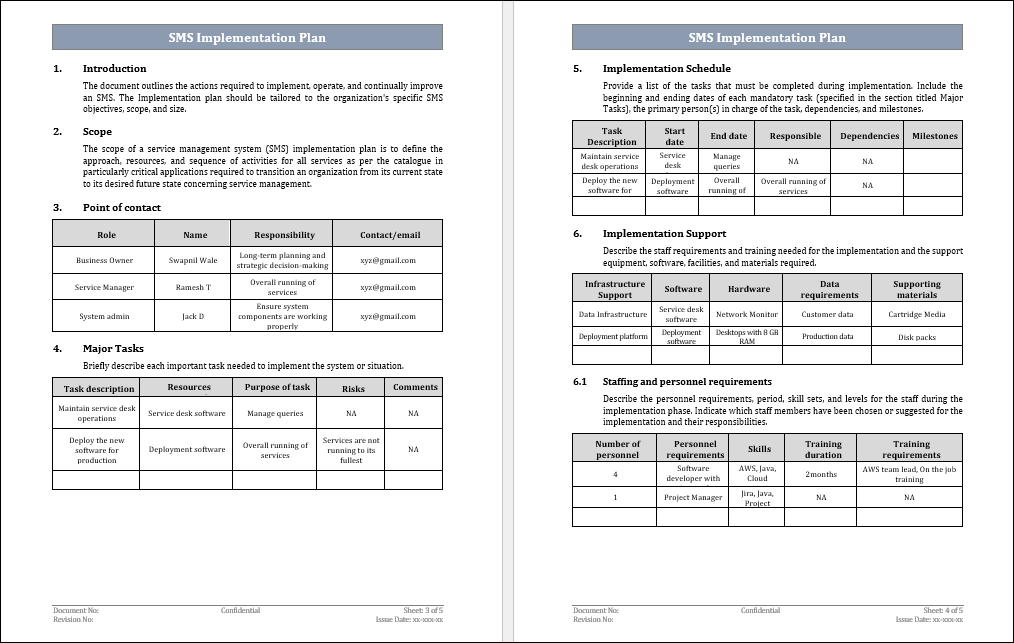Service Management System Implementation Plan Template
Introduction
A Service Management System Implementation Plan Template is a document that outlines the processes necessary to install an SMS in an organisation. The SMSIP must be adapted to an organization's specific needs and completed within a reasonable length of time. It should also take into account the organization's resources and limits. The SMSIP should be evaluated and modified on a frequent basis to ensure that it remains relevant and realistic. All stakeholders should review the plan to ensure that it fulfils your organization's requirements. Each step of the plan should include a clear list of tasks to be done. The program's success should be measured using evaluation criteria.

Purpose of Service Management System Implementation Plan Template
The Service Management System (SMS) Implementation Plan Template in IT Governance is an essential tool for organisations looking to streamline and improve their IT service delivery. It serves as a thorough reference, outlining the strategic alignment of service management activities with overall organisational goals and functions as a proactive risk management tool, recognising potential issues and suggesting risk-mitigation methods throughout the implementation process. It creates a structured timeline with milestones to help organisations track progress and measure achievement effectively. The template's clearly defined stakeholder participation ensures that essential teams and individuals are engaged, promoting collaboration and a shared awareness of the value of the service management system in meeting IT governance objectives.
Components Of Service Management System Implementation Plan Template
- Business Case: A business case is a document that summarises the benefits and risks of implementing a new standard. It should also consider the risks and advantages of implementation.
- Project Scope: The term "scope" should be defined clearly in the implementation plan. The plan should also include a list of particular actions needed to successfully adopt the standard.
- Timelines: The project implementation plan should include timelines for all actions necessary to execute the project. These dates must be realistic and attainable.
- Resources: In the plan, identify the resources needed to perform the project. These resources may include equipment, people, and software.
- Budget: Stakeholders should approve the project budget. It must include all costs and a breakdown. The budget should include a charge schedule as well as a final price estimate.
- Project timeline: Include significant milestones and the projected duration of each activity. The timetable should include the projected completion dates for the entire project.
- Quality Control: Quality control should be an inherent component of project planning, with evaluations occurring as deliverables become available. It will help ensure that the deliverables meet expectations.
- Project Management: The project plan should include a risk management section that covers potential project risks like scope creep and cost overruns.
- Reporting and Communication: A project plan should include a communication and reporting strategy to keep stakeholders informed about the project's progress and any modifications. The programme should explain how stakeholders will be notified.
Best Practices For Service Management System Implementation Plan Template
- Clear and Concise Language: Use clear and straightforward language to ensure that all stakeholders can easily understand the content of the plan.
- Executive Summary: Include a concise executive summary at the beginning of the plan, providing a high-level overview of the SMS implementation, its goals, and expected outcomes.
- Detailed Timeline: Provide a detailed and realistic timeline for each phase of the implementation.
- Responsibility Assignment Matrix (RAM): Use a Responsibility Assignment Matrix (RAM) or a RACI matrix to clearly define and communicate roles and responsibilities for each team member throughout the implementation.
- Regular Communication: Establish a robust communication plan, outlining how information will be disseminated to team members, stakeholders, and end-users.
- Training Plan: Develop a comprehensive training plan that considers the needs of both the project team and end-users.
Conclusion
A well-crafted Service Management System (SMS) Implementation Plan Template is a crucial tool for guiding organizations through the complex process of deploying and integrating a new service management system. The effectiveness of the implementation plan template relies on the incorporation of best practices, clear communication, and a comprehensive approach to project management. An effective SMS Implementation Plan Template is not just a static document but a dynamic guide that evolves with the project.

